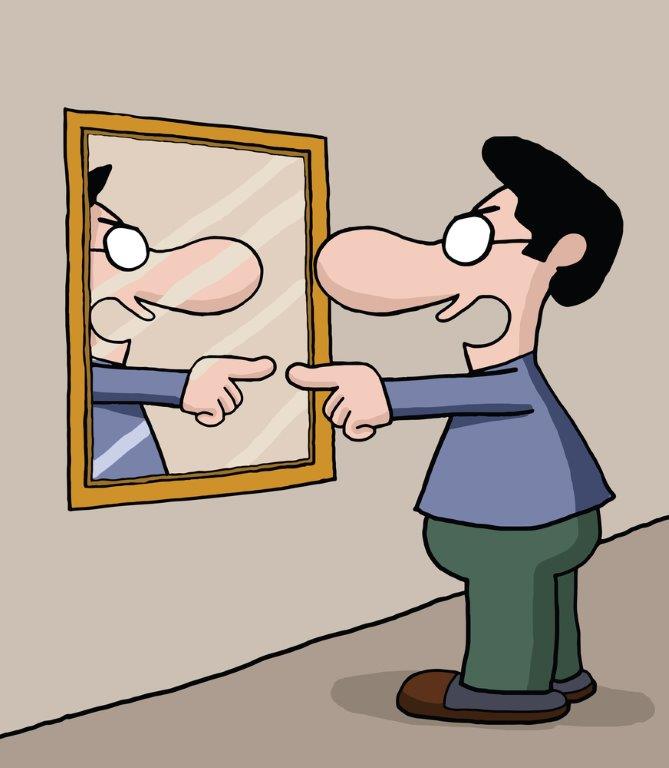
When we blame others for circumstances that negatively affect our business, we are disempowering ourselves and our people from finding solutions to the problem.
Sure, it was easy to throw our hands up in the air and point our finger at the other guy. But we encouraged our people to take that pointing finger, swing it around until it pointed right back at us, then ask, “What can we do to prevent this from reoccurring?” We found that somewhere in our own files were written documents that needed to be changed, updated, or newly created. Making the problem less likely to reoccur was what we were aiming for. We call this philosophy, “Aim, don’t blame.”
Instead of playing the victim, we took the situation as a challenge and somewhat of a game. How could we better clean up our own backyard? The winner finds the documents, makes the changes, and circulates the new procedure for handling the events leading up to the mishap. Then we are thrilled that we now have a better approach, and that this problem is far less likely to reoccur.
We found that most problems are caused by miscommunication. In other words, one party, either on our end or the company with which we were doing business, just didn’t quite get it. This really wasn’t all their fault, and we could reduce the chances that our communication to and from them would be misinterpreted in the future by refining our own procedures and documents.
Yes, when our company was new, we did our share of blaming. It was somehow comforting that we had nothing to do with it and that it was off our plate. But our customers still held us responsible. They didn’t care who was at fault; they just wanted value for their money.
Sometimes we lost sales because of the behavior of people outside of our company who handled our products. For example, truckers who worked for our buyers would occasionally forget to make appointments with our warehouse manager, resulting in them being unable to pick up our products. Then they would drive all the way back across the country to their destination, empty! We would be out of stock for weeks in that market.
At first we blamed them, but eventually we aimed at our own procedures and found that we needed to check in with our buyers’ ordering clerks to make sure they received the order from their purchasing agent. Then we needed to confirm that the trucking company’s dispatcher got the order from the buyer’s ordering clerk. We then checked in with both the dispatcher and driver to make sure they received the order, scheduled the pickup, and made an appointment with our warehouse manager to pick up the goods. Lastly, we made sure that our warehouse manager had the purchase order, and had the appointment scheduled.
Whew! Seems like a lot of babysitting, but it eliminated that particular reason for out-of-stocks. There were tons of other examples, but you get the idea. By focusing on how we could improve, we stayed empowered and in control. After all, we weren’t helpless, and there was no victory in being a victim.
You will be surprised how much control you really have when you “Aim, don’t blame!”
Who We Are

Michael Houlihan and Bonnie Harvey co-authored the New York Times bestselling business book, The Barefoot Spirit: How Hardship, Hustle, and Heart Built America’s #1 Wine Brand. The book has been selected as recommended reading in the CEO Library for CEO Forum, the C-Suite Book Club, and numerous university classes on business and entrepreneurship. It chronicles their humble beginnings from the laundry room of a rented Sonoma County farmhouse to the board room of E&J Gallo, who ultimately acquired their brand and engaged them as brand consultants. Barefoot is now the world’s largest wine brand.
Beginning with virtually no money and no wine industry experience, they employed innovative ideas to overcome obstacles, create new markets and forge strategic alliances. They pioneered Worthy Cause Marketing and performance-based compensation. They built an internationally bestselling brand and received their industry’s “Hot Brand” award for several consecutive years.
They offer their Guiding Principles for Success (GPS) to help entrepreneurs become successful. Their book, The Entrepreneurial Culture: 23 Ways To Engage and Empower Your People, helps corporations maximize the value of their human resources.
Currently they travel the world leading workshops, trainings, & keynoting at business schools, corporations, conferences. They are regular media guests and contributors to international publications and professional journals. They are C-Suite Network Advisors & Contributing Editors. Visit their popular brand building site at www.consumerbrandbuilders.com.
To make inquiries for keynote speaking, trainings or consulting, please contact sales@thebarefootspirit.com.






